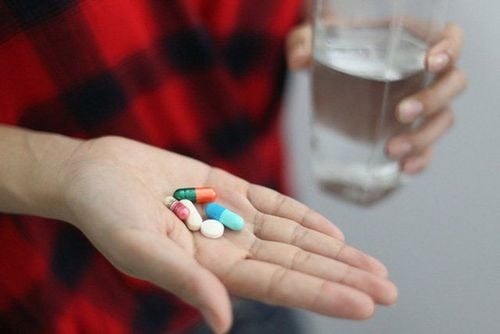This is an automatically translated article.
The article was written by MSc.Dr. Nguyen Thanh Long - Psychologist, Vinmec Times City International General Hospital.Postpartum depression is a very dangerous condition for both mother and baby, listen to the doctor's advice to better understand as well as know how to prevent and treat it properly.
1. What is postpartum depression?
Postpartum depression is a type of depression that can be acquired after giving birth. It can start any time during a baby's first year, but is most common during the first 3 weeks after birth. If you have postpartum depression, you may feel sad, hopeless, and guilty because you may not feel like bonding with, or caring for, your baby.
2. Effects of postpartum depression
Postpartum depression affects the mother and baby:
The mother has insomnia and anorexia, which causes her health to decline, mental and intellectual impairment affecting work and daily life.
Mothers have anxiety, pessimism and negative thoughts that make them no longer enthusiastic at work. In some of the worst cases, a mother can commit suicide or kill her own child.
The mother does not want to be close to her child, causing the baby to lack the mother's love and care.
3. Postpartum depression what to do?

Phụ nữ trầm cảm sau sinh cần sự hỗ trợ của bác sĩ trị liệu tâm lý nếu tình trạng này càng nặng
When you or your loved one has signs of postpartum depression, face it and see a doctor right away for timely treatment. In case you or a loved one has signs of postpartum psychosis, you need help from a psychotherapist when the following characteristics appear:
Does not subside after two weeks. Getting worse and worse. Make it difficult for you to care for and love your baby. Causes difficulty in daily activities. Having thoughts of harming yourself or your baby. Want to commit suicide. In case you want to commit suicide or harm your baby:
Try to stay calm and immediately call the emergency numbers. Find a loved one or friend to help, talk to them Contact, talk to people you admire, or your spiritual leader Find ways to mingle, help others People with depression A cold may not be able to recognize itself as having an illness. If you suspect a loved one has postpartum depression or is developing postpartum psychosis, help them seek medical attention.
4. Ways to help women avoid postpartum depression

Người trầm cảm sau sinh cần gắn kết tình cảm của mẹ với bé và sự giúp đỡ của người thân
4.1. Creating a Secure Attachment to Your Baby The emotional bonding process between a mother and her baby, known as attachment, is the most important task of childhood. The success of this nonverbal relationship allows the child to feel secure enough to develop fully and influences the way the child will interact, communicate, and form relationships throughout life.
When the baby cries, you quickly soothe the baby. If your baby smiles or laughs, you respond in kind. In essence, you and your child are in sync. You recognize and respond to each other's emotional cues. Postpartum depression can disrupt this link. A depressed mother can be loving and attentive to her baby, but can sometimes react negatively or not at all. Mothers with postpartum depression tend to interact less with their babies, and are less likely to breastfeed, play, and read to their children. They may also be inconsistent in how they care for their newborn.
However, learning to bond with your baby not only benefits your baby, it also benefits you by releasing endorphins that make you feel happier and more confident as a mother.
4.2. Get help and support from others Positive social exposure reduces stress faster and more effectively than any other stress reliever. When you're feeling depressed and vulnerable, it's more important than ever to connect with family and friends, even if you want to be alone. Let your loved ones know what you need and how you would like support.
Speak your heart out: In addition to the practical help your friends and family need to share what you are experiencing, the good and the bad with at least one other person, preferably face to face. It doesn't matter who you talk to, as long as that person is willing to listen without judgment and offer reassurance and support.
Join a group of new mothers: Lack of social interaction is one of the factors that put you at risk of depression. Join groups of new mothers to understand that you are not alone in the pressure and change of having a baby. Sharing and understanding with friends and people around will help you relieve stress.
4.3. Take Care of Yourself One of the best things you can do to reduce or avoid postpartum depression is to take care of yourself. The more you take care of your mental and physical health, the better you'll feel:
Don't be too busy with work - You shouldn't take all the work and responsibilities on yourself. Share less chores around the house. Allow yourself to focus on yourself like buying, this helps you reduce stress and find joy in life for yourself.
Make time for gentle exercise. Studies show that exercise can be as effective as medication when it comes to treating depression, so the sooner you start exercising, the better. No need to overdo it: just 30 minutes of walking a day. Stretching exercises like yoga have been shown to be particularly effective.
Meditate. Research supports the effectiveness of meditation in helping you feel calmer and more energetic. It can also help you become more aware of what you need and what you feel.
Take advantage of sleeping when your child sleeps. An eight-hour day may seem like an unattainable luxury when you have to take care of a newborn, but poor sleep makes depression worse. Advice for mothers is to take advantage of sleeping when their children sleep, even if it is daytime. This ensures that the mother does not fall asleep.
Take time for yourself to relax and rest more. Find small ways to pamper yourself, like taking a dip in warm water, enjoying a hot cup of tea, or lighting scented candles and massages.
Make meals more nutritious. When you are depressed, nutrition is often affected. What you eat affects your mood, as well as the quality of your breast milk, so do your best to establish healthy eating habits.
Get out in the sun . Sunlight lifts your mood, so try to get at least 10 to 15 minutes of sun every day.

Thư giãn và dành thời gian cho bản thân
Please dial HOTLINE for more information or register for an appointment HERE. Download MyVinmec app to make appointments faster and to manage your bookings easily.













